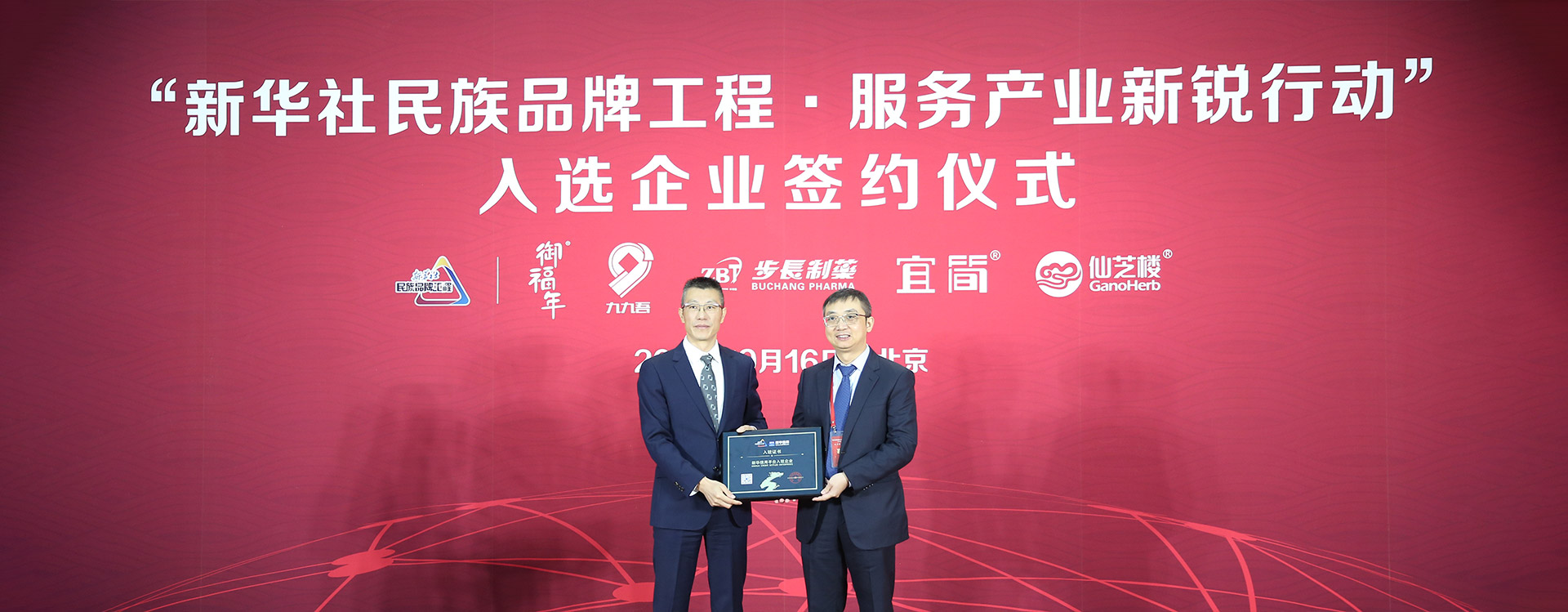Lingzhi improves blood viscosity, microcirculation and insulin resistance in hypertensives
- Categories:Media Center
- Time of issue:2021-06-10 09:45
- Views:
Lingzhi improves blood viscosity, microcirculation and insulin resistance in hypertensives
- Categories:Media Center
- Time of issue:2021-06-10 09:45
- Views:
Whether used alone or in combination, Lingzhi (also called Ganoderma lucidum or Reishi) has the effects of regulating blood pressure, reducing subjective symptoms and improving blood lipids. Moreover, long-term use of Lingzhi will not cause negative effects on body functions. For details, see "Clinical tests 50 years ago have confirmed that Lingzhi can improve hypertension" and "Clinical studies have confirmed that Lingzhi improves high blood pressure but does not affect normal blood pressure".
However, Lingzhi not only has the above benefits for hypertension but also improves the blood viscosity, microcirculation (blood circulation of capillaries), blood sugar and insulin resistance in hypertensive patients. Even without affecting blood pressure, it can promote microcirculation and increase blood perfusion in healthy people.
Lingzhi improves blood pressure in hypertensive patients with high blood viscosity.
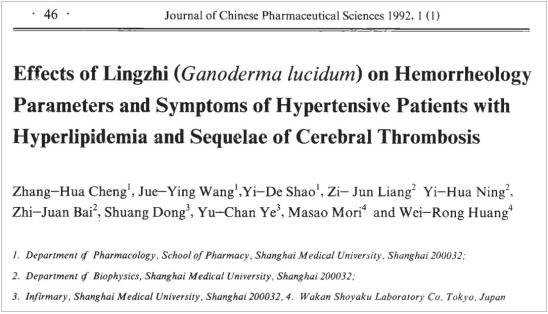
In 1992, Shanghai Medical University and Wakan Shoyaku Laboratory Co jointly published a clinical report in the "Journal of Chinese Pharmaceutical Sciences", which analyzed the benefits of eating Lingzhi on patients with both cardiovascular diseases and high blood viscosity. A total of 33 subjects (45 to 86 years old) were tested, and 17 of them had hypertension.
They took 2 Lingzhi tablets (containing 110 mg of Lingzhi fruiting body water extract, equivalent to 2.75 g Lingzhi fruiting body) per day. After 2 weeks, more than half of the subjects improved their symptoms such as headache, dazzle, numbness of the limbs, chest tightness and insomnia; for people with high blood pressure, the systolic and diastolic blood pressure decreased by 12.5 mmHg (8.5%) and 6.4 mmHg (7.2%), respectively, which is a statistically significant difference compared to before the test (Figure 1).
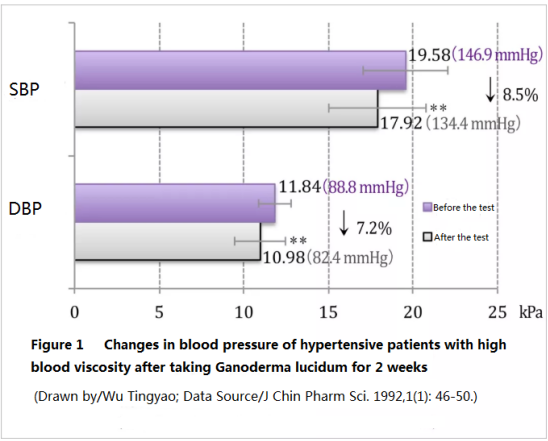
Blood pressure can be affected by heart rate (the number of times the heart beats per minute at rest) and is also positively correlated with blood viscosity (blood flow resistance).
Since all the subjects (including those with normal blood pressure) had no significant difference in heart rate before and after the test (74 times→77 times), they were all in the normal range, but the blood viscosity was significantly reduced. Therefore, it is speculated that the reason why Lingzhi can lower the high blood pressure may be related to the improvement of blood viscosity.
Lingzhi improves difficult-to-treat high blood pressure and also improves blood viscosity and microcirculation.
To further confirm that there is a relationship between the improvement of high blood pressure by Lingzhi and the improvement of blood viscosity, the team from Shanghai Medical University and Wakan Shoyaku Laboratory Co, in collaboration with the Fourth People's Hospital of Xuzhou City, used the same Lingzhi preparations as in the above study to conduct a randomized (grouped), double-blind (both the investigators and the subjects did not know which group the subjects were assigned to) and placebo-controlled clinical test in patients with refractory hypertension.
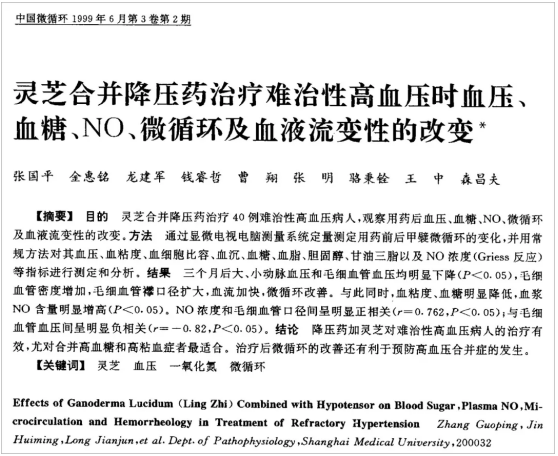
According to the researcher's paper published in "Journal of Chinese Microcirculation" in 1999, the "refractory hypertensive patients" who participated in the clinical test included patients with essential hypertension who received the treatment of captopril (angiotensin converting enzyme inhibitor) or nimodipine (calcium antagonist) for more than one month but their blood pressure still exceeded 140/90 mmHg.
The average age of the subjects was 57.8 ± 9.6 years, and the male to female ratio was about 2:1. During the test, the patients who originally took western medicine took western medicine as usual. The placebo group (13 cases) took placebo every day while the Lingzhi group (27 cases) took 6 Lingzhi tablets every day (containing 330 mg Lingzhi fruiting body water extract), which is equivalent to 8.25 g of Lingzhi fruiting body; this dose is 3 times that of the aforementioned clinical test published in 1992).
(1) Overall improvement in blood pressure
After 3 months of test, the blood pressure of the Lingzhi group, whether it is aortic blood pressure (measuring the arm), arteriolar blood pressure (measuring the finger) or capillary blood pressure (measuring the nail fold-the skin fold bordering the lower edge of the nail and covering the root of the nail) were significantly lower than before the test, but there was no significant change in the placebo group (Figure 2).
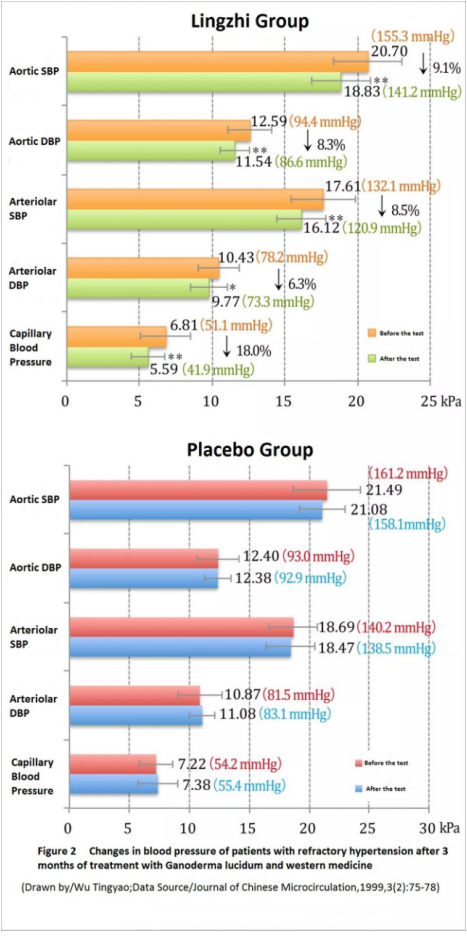
(2) Blood viscosity also decreased
At the same time, the main indicators for evaluating blood viscosity, including high shear rate (fast blood flow speed) whole blood viscosity, low shear rate (slow blood flow speed) whole blood viscosity and plasma viscosity that affects whole blood viscosity (the blood viscosity after removal of blood cells, which is affected by the content of protein, fat and blood sugar), decreased significantly in the Lingzhi group while the placebo group stayed in place (Figure 3).
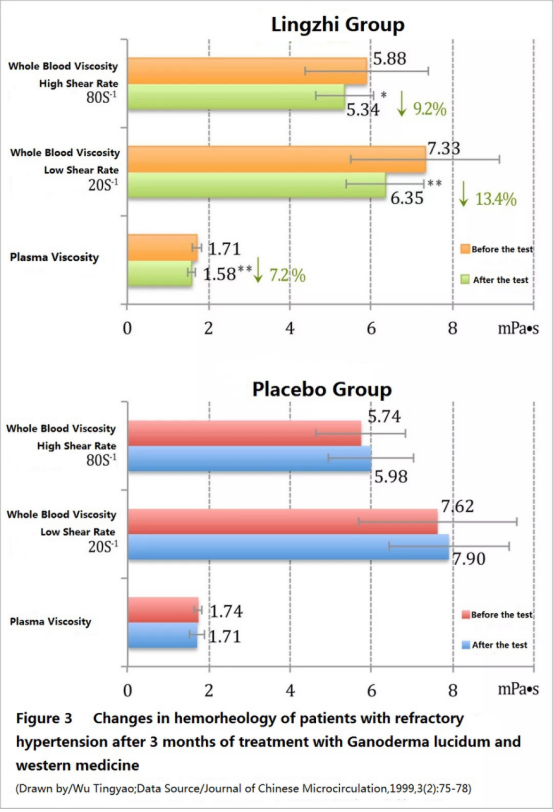
(3) Microcirculation gets better
In addition, as shown in Figure 4, at the end of the test in the Lingzhi group, the density of nailfold capillaries (also known as loops) increased significantly, while the placebo group still maintained the level before the test, showing that Lingzhi has the effect of promoting microcirculation. [Note: The nailfold capillary is hairpin-shaped, that is, a long and narrow inverted U shape. This type of structure is called "loop".]
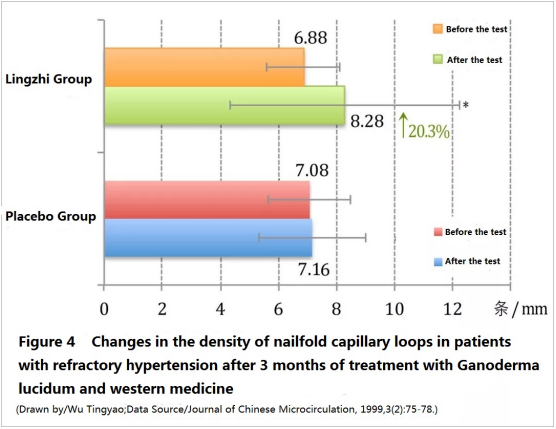
From Figure 2 to Figure 4, the data of all Lingzhi groups after the test are marked with * or **, which means that the statistical p value is less than 0.05 or 0.01, respectively. They represents a statistically significant difference compared with before the test. Among them, the difference of ** is more significant than that of **, but such a difference did not occur in the placebo group.
Therefore, we can say that for essential hypertension that cannot be cured by western medicine, if the patient takes Lingzhi fruiting body hot water extract preparation every day, he will not only have a good chance to lower blood pressure but also improve blood viscosity and microcirculation by the way. It only takes patients about three months to prove the efficacy of Lingzhi. Why not?
(2) The increase of nitric oxide that dilates blood vessels
It is worth mentioning that the researchers observed that the plasma nitric oxide (NO) concentration of some subjects in the Lingzhi group increased significantly after the test, and it was correlated with the improvement of capillary pressure, that is, those subjects whose capillary pressure became better after taking Lingzhi usually have a higher concentration of nitric oxide in the plasma (Figure 5).

Nitric oxide is synthesized by vascular endothelial cells. When it is released into the plasma, it can dilate blood vessels and regulate blood pressure. Many hypertensive patients suffer from vasodilation disorders caused by insufficient nitric oxide synthesis. Therefore, researchers believe that Lingzhi's improvement of hypertension and microcirculation should be partly related to its promotion of nitric oxide synthesis.
Lingzhi can also improve insulin resistance in patients with hypertension.
If you think Lingzhi only has the aforesaid benefits for hypertensive patients, I must say that the story is not over yet!
In 2001, a clinical report published in Hainan Medical Journal by Xuzhou Institute of Cardiovascular Diseases pointed out that Lingzhi fruiting body hot water extract preparation that can improve hypertension, blood viscosity and microcirculation in the aforementioned 1992 and 1999 studies can also improve insulin resistance.
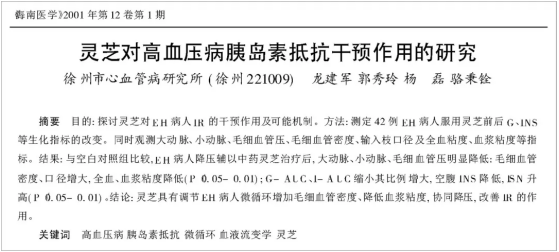
Although many patients with essential hypertension have normal blood sugar, they have insulin resistance. In other words, their tissue cells are relatively insensitive (resistant) to insulin, forcing the islet cells to secrete more insulin in order to send the glucose in the blood into the tissue cells and maintain normal blood sugar.
How are insulin resistance and high blood pressure related to each other? I won’t go into details here, let’s get straight to the topic and see how this clinical test is conducted.
All subjects were patients with essential hypertension who had taken captopril and Nifedipine (calcium antagonist) for a long time but still had blood pressure fluctuations of 140 ~ 160/90 ~ 100 mmHg. They have neither diabetes nor complications related to the heart, kidney and brain.
Among them, 27 cases were assigned to the Lingzhi group, supplemented with 6 Lingzhi tablets a day, and the other 15 cases were given placebos as a comparison with the former. Western medicine remained the same for the two groups during the test period. After 3 months, the Lingzhi group not only improved blood pressure, blood viscosity and microcirculation but also significantly improved insulin resistance and blood sugar regulation.
The evaluation basis for the last two is the result of the oral glucose tolerance test (OGTT). Figures 6 and 7 show the blood glucose changes and insulin secretion after the subjects drank a large amount of glucose on an empty stomach, respectively.
Under normal circumstances, the fasting blood glucose level should be between 3.9 and 6.1 mmol/L, and the blood glucose peaks at half an hour to 1 hour after taking glucose (generally 7.8 to 9.0 mmol/L, and the highest value does not exceed 11.1 mmol/L), the blood glucose drops to below 7.8 mmol/L within 2 hours, and blood glucose returns to fasting level within 3 hours.
Judging from this standard, although the blood glucose fluctuations of the Lingzhi group before and after the test are within the normal range, the body conditioned by Lingzhi can significantly control the increase in blood glucose level. But such changes did not appear in the placebo group (Figure 6).
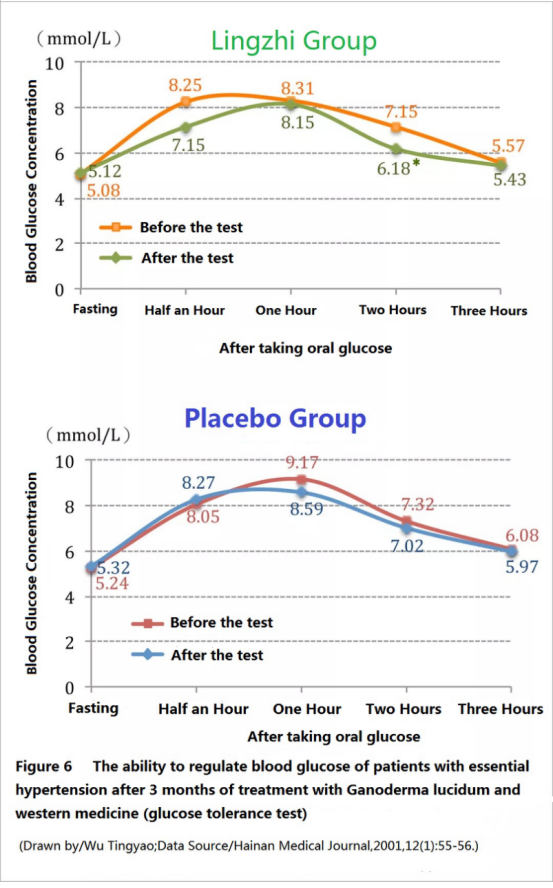
Let's look at the amount of insulin secretion during the glucose tolerance test. In the Lingzhi group, the amount of insulin secretion after the test was less than that before the test at each time period (Figure 7).
The amount of insulin secretion is reduced but the blood glucose concentration is still well-controlled, which indicates that the tissue cells of the body are more sensitive to insulin, that is, the body can better metabolize glucose with less insulin, thereby preventing too much blood glucose from straying in the blood.

Insulin resistance can be said to be the key source of abnormal metabolism in the body. Chronic inflammation, obesity and three highs are all related to insulin resistance. When Lingzhi regulates blood pressure, it can also simultaneously control insulin resistance, and even quicken qi and the blood. Isn’t it exciting to have a drug with such a high CP?
Lingzhi can also promote microcirculation in healthy people.
So far, I hope that the sharing of these first-hand information will bring positive meaning for lowering your blood pressure.
If you want to ask if Lingzhi, which is beneficial to hypertensive patients, is suitable for normal people to eat? Does it help? The answer is yes.
Because Shanghai Medical University and Wakan Shoyaku Laboratory Co cooperated with Nanjing College of Traditional Chinese Medicine to conduct a test on 57 cases (29 males and 28 females, with an average age of 33.86±10.39 years old) of students and workers from the medical university with normal blood pressure, normal blood lipids, normal blood sugar and no obvious diseases.
The results found that taking 2 Lingzhi tablets (same as the hot water extract preparation of Lingzhi fruiting body used in the above-mentioned clinical tests) 3 to 4 times per day for 1 week can significantly promote microcirculation and increase capillary perfusion without affecting the heart rate, blood pressure and blood flow rate. But the effect is not significant at less than this dose.
The researchers specifically pointed out in the report that the increase in microcirculation perfusion is very beneficial to improve and protect the function of tissues and organs. Therefore, they believe that "As a health product, Lingzhi has a wide range of development potential for healthy people (especially middle-aged and elderly)". The above effects disappeared on the second day after the subjects stopped taking Lingzhi, so the researchers believed that it is important to continue taking Lingzhi.
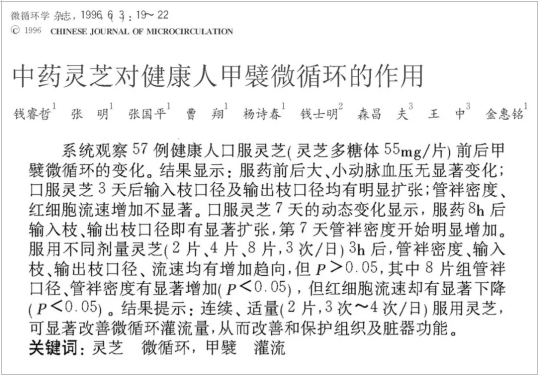
Did you notice? The hot water extract of Lingzhi fruiting body of the same source, same specification and same dosage is suitable for healthy people and can be used in combination with western medicine for hypertensive patients.
What does it mean that Lingzhi has the function of supporting right and securing the root? What does it mean that Lingzhi can "cure existing diseases" and "be used for the preventive treatment of diseases"? These 4 clinical reports on Sino-Japanese cooperation may be the best annotations.
References
1. Zhang-Hua Cheng, et al. Effects of Lingzhi (Lingzhi) on Hemorrheology Parameters and Symptoms of Hypertensive Patients with Hyperlipidemia and Sequelae of Cerebral Thrombosis. J Chin Pharm Sci. 1992,1(1): 46-50.
2. Zhang Guoping, et al. Effects of Ganoderma Lucidum (Ling Zhi) Combined with Hypotensor on Blood Sugar,Plasma NO,Microcirculation and Hemorrheology in Treatment of Refractory Hypertension. Journal of Chinese Microcirculation, 1999;3(2): 75-78.
3. Long Jianjun, et al. Effects of Linzhi on Insulin Resistance in Patients with Essential Hypertension. Hainan Medical Journal, 2001,12(1): 55-56.
4. Qian Ruizhe, et al. Effects of Ganoderma Lucidum on Nailfold Microcirculation in Healthy People.Chinese Journal of Microcirculation,1996, 6(3): 19-22.
END

★This article is published under the exclusive authorization of the author, and the ownership belongs to GanoHerb.
★Do not reprint, excerpt or use the above works in other ways without the authorization of GanoHerb.
★If the work has been authorized to use, it should be used within the scope of authorization, and the source should be indicated: GanoHerb.
★GanoHerb will investigate and affix the relevant legal responsibilities of those who violate the above statements.
★ The original text of this article was written in Chinese by Wu Tingyao and translated into English by Alfred Liu. If there is any discrepancy between the translation (English) and the original (Chinese), the original Chinese shall prevail. If readers have any questions, please contact the original author, Ms. Wu Tingyao.


Search
GanoHerb Group
Headquarters Address: Building 9, Phase 1, Innovation Park, Haixi Park, Fuzhou High-tech Zone, Fuzhou City, Fujian Province, China
Healthline:400-8899-773 Hotline:18105908051
COPYRIGHT © GanoHerb Group 闽ICP备05002116号-10 Powered by:300.cn

官方公众号
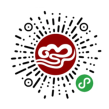
Wechat Mall
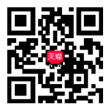
Tmall

Jingdong Mall

